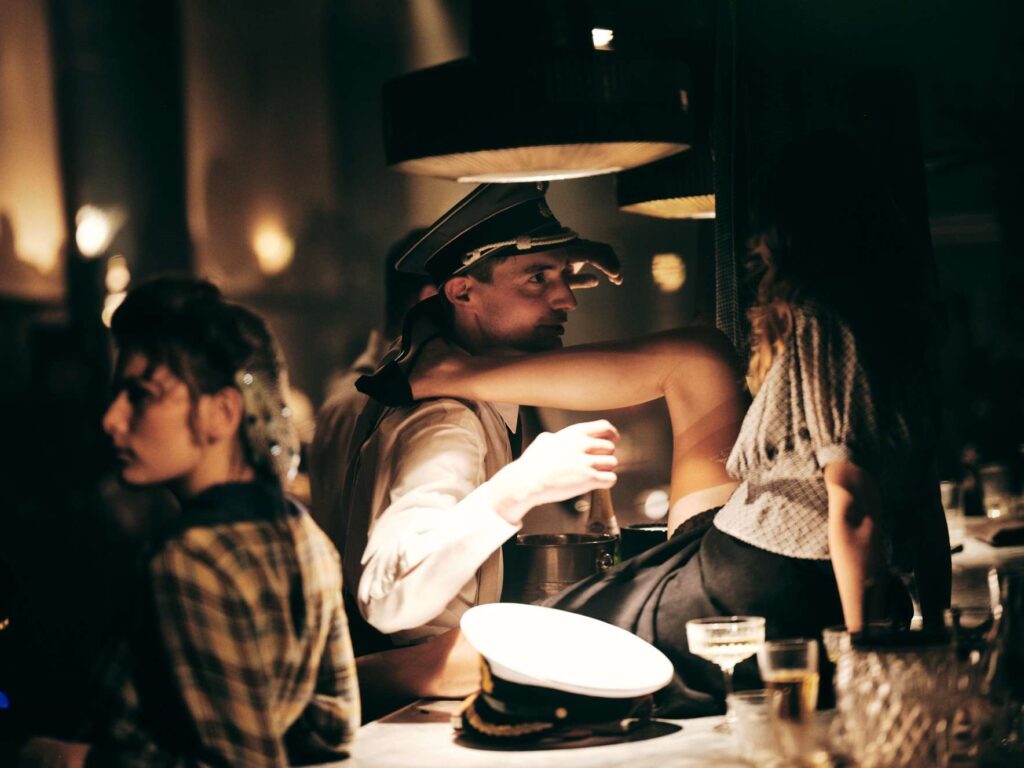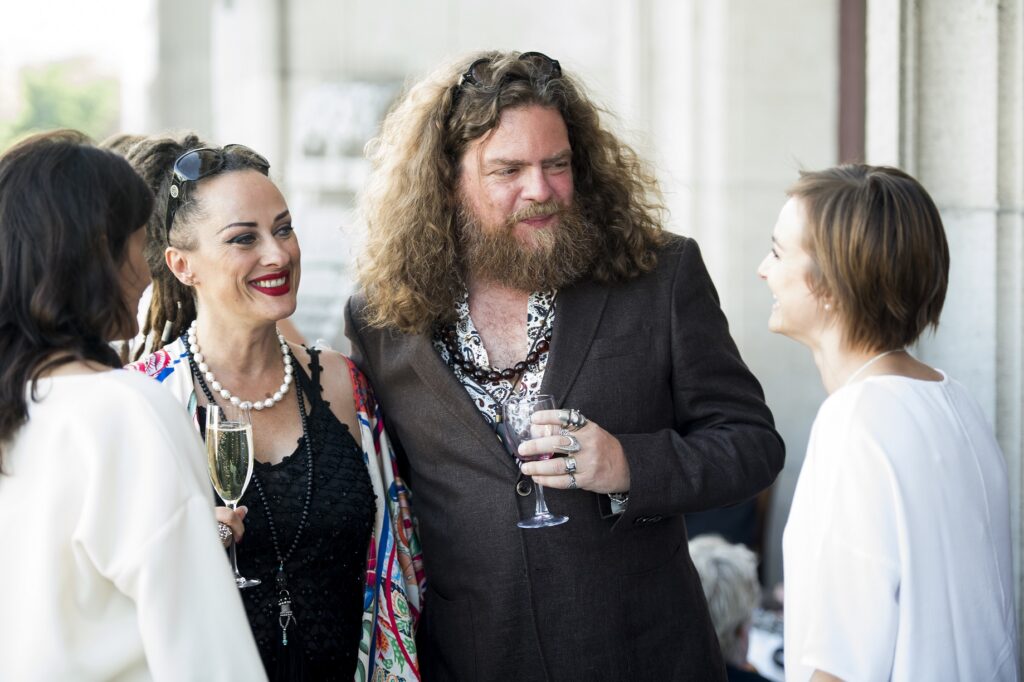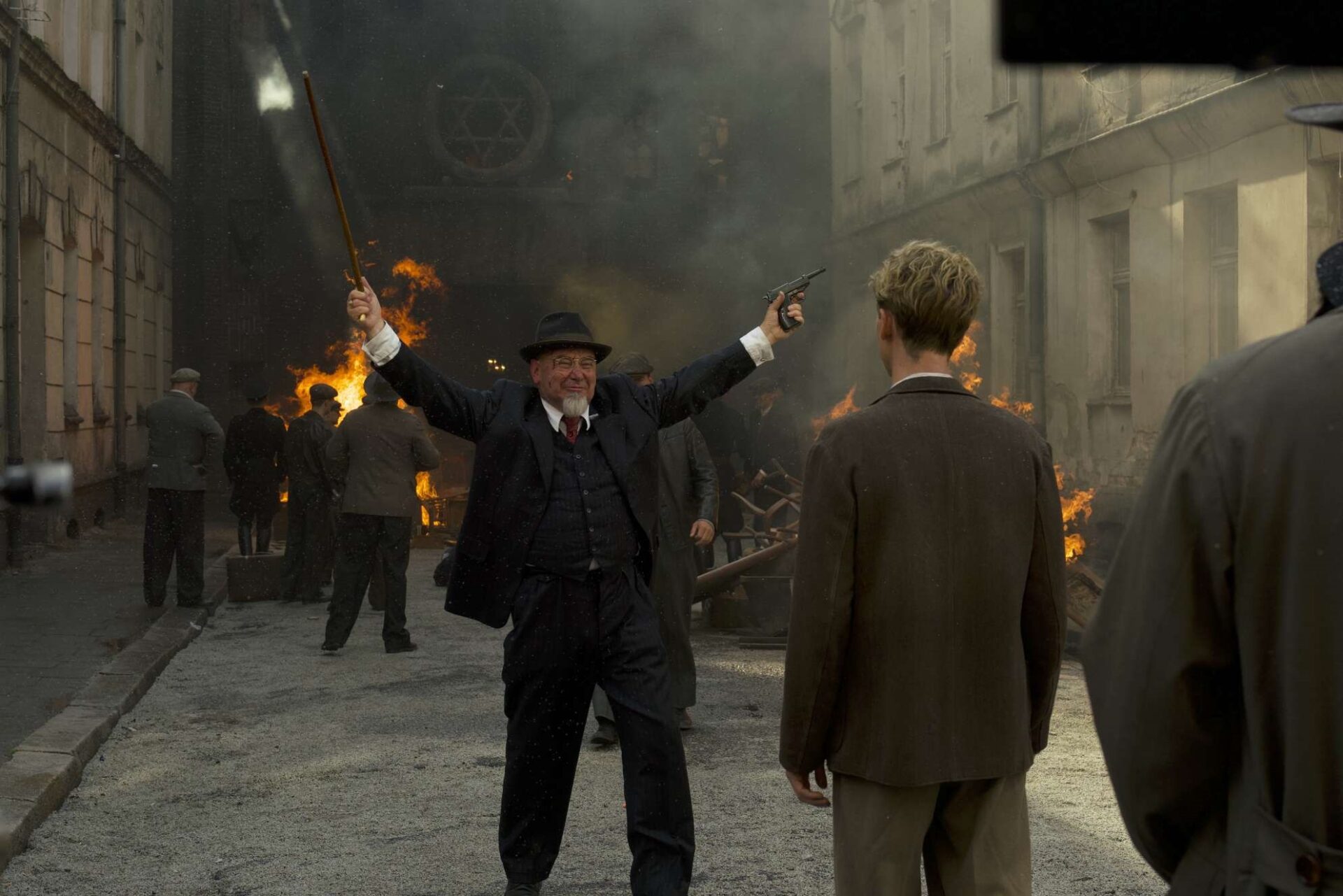“What would you have done?”
This is the question volleyed around tram cars and at red lights as people head to the cinema to see the movie Wil (the title is sometimes stylised as WIL), which is quickly becoming one of the most successful Flemish films in recent history.
Directed by Tim Mielants and starring heavyweights Koen De Bouw and Jan Decleir, it tells the story of Wilfried Wils, a fictional police officer in wartime Antwerp. It is based on the bestselling book of the same name by author Jeroen Olyslaegers.
The film is a thriller, violent and disturbing, presented in the 4:3 ‘academy’ aspect ratio with each scene carefully choreographed for the maximum discomfort of its audience. If the commute to see the movie was filled with dinner table debates and jaunty assertions of philosophical viewpoints, the ride home will be silent. The question – ‘What would you have done?’ – takes on a darker meaning when the implications have been presented unsanitised in full colour.
Olyslaegers recognises the dilemmas. “If your answer is, ‘I don’t know what I would do, but the question makes me uncomfortable,’ you’re already there,” he says.
Sitting at a coffee shop on Wisselstraat and Oude Beurs, not far from the Vleeshuis where he wrote his novel Wildevrouw, the 56-year-old author pretends not to have noticed that the people at a nearby table have recognised him from the nature of the conversation and are not-so-inconspicuously eavesdropping. When Wil was published in 2016, he became a literary star almost overnight – a result he finds conflicting, considering the story’s roots and ruthlessness. Titled Will in its English translation, it won The Times Historical Fiction Book of the Year in 2019.
Here in the city of Antwerp, the author is surrounded by the setting of his story, both Wil and his own. Antwerp is where Olyslaegers went to school, lived and worked. And Antwerp is where an estimated 9,009 Jewish people were pulled from their homes and sent to die in concentration camps during the Holocaust (assuming they were not killed beforehand by mob or murder, state-sanctioned or otherwise).
Antwerp presents itself as a unique case, according to research from Belgian scholar Lieven Saerens. While the percentage of registered Jews deported to concentration camps from other cities like Brussels, Liège and Charleroi ranged from 35 to 40%, Saerens estimates that the figure in Antwerp is at least 65% – one of the highest in Western Europe.
In his search for an explanation for why the number would be so much higher, Saerens eventually lands at the conclusion that a critical factor was the extent of local cooperation – the willingness of the people and authorities of Antwerp to help their German occupiers.

Scene from the movie, set in Antwerp during the occupation
Saerens’ findings sparked outrage in the city at the time of their publication in 1983, with one Antwerp writer stating that the research “besmirches the honour of the University of Leuven” and another going as far as to say it “should not be considered a historical document.”
The archived documents have been studied by Saerens and Herman Van Goethem, a Belgian historian, jurist, professor and director of the Kazerne Dossin museum and memorial in Mechelen. (Saerens was later awarded the Hubert Pierlot prize and the prize of the Province of Antwerp for his thesis about the attitude of the people of Antwerp towards Jews from 1880 to 1944.). But as time puts more and more distance between the names in the archives and their ancestors, the reality will be microdosed.
Razzia report
Perhaps it helps to make the people characters, the city a setting. The story of Wil began with a police report, which Olyslaegers came into contact with through Van Goethem.
“You have to realise that these police guys – these normal, low-pay cops – most of them never finished school,” Olyslaegers explains. “So they seldom wrote police reports. They went on patrol and then afterwards they went to a superior and told them what happened during their day, with a deputy then deciding if anything needed to go further up the chain to the mayor, to the court of justice, to the Germans.”
The police report that Van Goethem showed Olyslaegers was written after a razzia, a raid in which Jewish people were pulled violently from their homes and rounded up to be sent to concentration camps. In it, the police officer detailed his participation.
“This cop, this police officer, he implicated himself in his own report,” recounts Olyslaegers with some incredulity. “He committed crimes, wrote them down and gave the report to his deputy. It was an incredibly dangerous thing to do, and it wasn’t an accident.”
But there was something else striking about the report, beyond its mere existence and the fact that its author was also its subject.

Scene from Wil, in an Antwerp cafe
“I saw the name of my own street,” Olyslaegers recalls. “And that’s when I realised. A writer pretends he’s looking for material, that he’s looking for something to write. But it’s much more mysterious than that. It’s the material that looks for you. For me, stories are organic. They want to be materialised through you. Because of that police report, I wrote a novel.”
At the time, not taking part in the razzia could have meant a police officer’s death – so Olyslaegers likens him reporting his treatment of Jewish people as a crime to being stranded on an island and putting a message in a bottle. “It’s cliché, perhaps, but it’s as though he wrote the police report, put it in a bottle, and threw it in the sea of time. And it washed up on my shore.”
In Wil, the fictional police officer protagonist attempts to help the resistance while keeping his life, and his world becomes “blurry,” as Olyslaegers puts it. In one instance, Wil finds himself dragged into a packed Antwerp theatre where an anti-Jewish rally is in full swing. He recognises the faces of colleagues among the increasingly violent crowd, but who’s to say which of them are there voluntarily or, like himself, being held half-hostage?
For the film, the scene was shot in Mechelen using members of the Royal Antwerp Football Club’s infamous ‘Antwerp Casual Crew’ (ACC) as extras. It’s one of the tensest parts of the movie, one whose implications cling to the viewer long after they’ve left their own theatre. Olyslaegers, who was involved in the screen adaptation (and even has a cameo appearance), was present for its shoot.
“It was really realistic and really frightening,” he recalls. “It was provocative, it was dangerous. I remember it was a sunny day so people were sitting on terraces drinking, enjoying the sun, and then they see this violence….It’s fake movie violence, but at the same time, it felt real. I left because for me, it was too much. I felt, in a strange way, totally guilty. I thought, ‘Jesus Christ, they're creating my story and I’m seeing the birth of fascism made on a movie set.’”
De Morgen’s critic Lieven Trio describes Wil as doing away with “the war film's greatest illusion: heroism.” It’s one of the novel’s achievements, as well – to challenge anyone who leaps to make a judgement on the survivors of Nazi occupation.
“A moral judgement is cruel because it’s rarely nuanced,” Olyslaegers says. “There’s ambiguity in all of us. We’re locked in the present. Every moment, we’re bound to this wreede heden, this cruel present. We do things, we say things, we make plans, and we have no idea what the consequences will be tomorrow, next week, next year.”
Dark history
The questions Antwerpaars, Belgians and anyone who’s descended from the survivors of what many consider to be history’s darkest period, put to their families – “Did you collaborate? Were you part of the resistance? Or were you neutral, just looking at it and doing nothing?” – aren’t bound to this specific time.
“It doesn’t stop,” says Olyslaegers. “It didn’t stop for the generation of our grandparents, and it won’t stop for us. We will all face moral judgement.”
Today, that includes climate change, the violence in the Middle East, and the war in Ukraine. “Our grandchildren will look at us and tell us the bad news: ‘You didn’t do anything.’ And you can say, ‘I tried to protect my family.’ And they will say, ‘clearly that wasn’t enough,’” he says.
Antwerp is a Baroque city, as Olyslaegers describes it. Like a Rubens painting, its contrasts between light and dark are bold and defining – tenebrism, affecting the whole composition.

Jeroen Olyslaegers in the middle
“For me, it was really difficult at the end – I did so much research and then I wrote the book and then when the book was published, the ghosts were still there. I still realise every day what happened on that particular street corner 75 years ago. Sometimes I’d even get this anger – this totally irrational anger – at the people I’d see just walking by it in ignorant bliss.”
It’s partly for that reason that Olyslaegers’ next novel will be set at the end of the 19th century. “I wanted to look at Antwerp from a totally different time perspective because it’s unfair to look at it solely based on what happened in the Second World War.”
As unfair as the questions that, like the ghosts Olyslaegers sees on his old street, still haunt families today. What would you have done?
“Would you die for your partner or your family? It’s easy to answer, ‘of course,’” he says. “Now, would you die for a flag? For your country? For a principle? For the difference between good and bad? And if you won’t, is that wrong? Is that cowardice?”
A story that can move people, literally – physically make them squirm as they’re forced to confront these questions, to confront what they believe or think they believe about themselves – that’s Wil’s power.
“There was no need for it,” Olyslaegers says of the police report that started it all – that both validated the nuance researchers gave to Antwerp authorities’ collaboration with Nazis and spurred a novel that leaves an indelible mark on its readers.
The officer who’d participated in the violence of the razzia could have written nothing. Said nothing. He could have gone home after his shift, hung his police cap on its hook, and let his crimes, anonymous and evidence-free in the chaos of their time, go unrecorded in the annals of history.
So why did he write a police report? One that put his own crimes into an official public archive so that they could be discovered and viewed by a historian and a novelist 75 years later?
Seated at the coffee shop less than two kilometres from the street, where Wil reaches its climax, Olyslaegers can think of only one reason.
“It was an act of conscience,” he says, gazing down Oude Beurs where city workers are going about their jobs, emptying public waste bins, moving metal barricades to divert morning traffic, and patrolling their designated areas. A street sweeper vacuums up a cigarette butt from the street before a toddler holding the hand of a woman in a hijab can snatch it up out of curiosity. The wheels of Antwerp keep turning.
“Conscience,” says Olyslaegers. “He had to write it for his conscience.”

